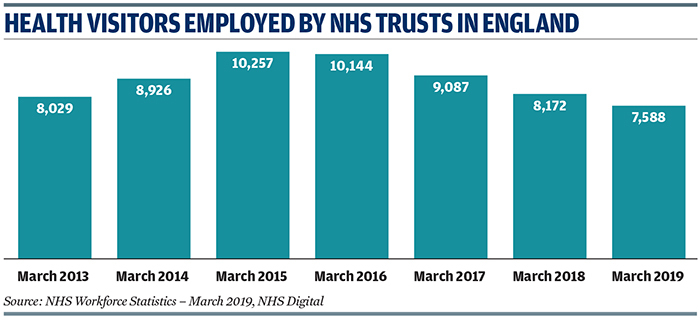
While the NHS remains the biggest employer of children's health professionals, many now work in multi-agency teams. In the children's sector, roles cover a wide range of areas including nursing, midwifery, health visiting, paediatrics, mental health, substance misuse and sexual health.
There are currently widespread shortages of nurses across the UK although the number of children's nurses increased from 49,793 in 2018 to 51,005 in 2019, according to the Nursing and Midwifery Council (NMC). In June 2019 the NHS published its interim People Plan, featuring plans to increase the number of nurses and develop new routes into the profession including looking at a blended learning nursing degree partly delivered online.

The NHS Long Term Plan, launched at the start of the year, contains a number of commitments under a Children and Young People's Transformation Programme. These include a move towards a 0-25 service, an expansion of the neonatal nursing workforce including the creation of extended support roles, and the development of new services for children who have been sexually assaulted. By 2023/24 children and young people with the most complex needs who have a learning disability or autism will have a designated keyworker.
Since August 2017, new nursing, midwifery and allied health students in England no longer receive NHS bursaries, and instead have to take out student loans. In Wales, the student nursing bursary has been extended until 2020, and it has remained in Northern Ireland and Scotland. England has seen a drop in applications to study nursing and one in 20 places to study nursing across the UK were not filled this year, according to a report from the Open University. A survey of young people who had considered nursing as a career found the cost of studying alongside entry requirements and workload were key deterrents. The Learning Support Fund can provide some financial support but applications have not been as high as expected and the NHS has said it will review the system.
New routes into nursing including a nursing associate role designed to bridge the roles of healthcare assistant and registered nurse. The first qualified nursing associates registered with the NMC in January 2019, and more than 1,000 have now registered. In all 7,000 students have begun training since the role was agreed in January 2017, and Health Education England aims to recruit a further 7,500 in 2019.
Since 2017, potential nurses have been able to take degree-level apprenticeships, combining university study with paid work. The government expects over 400 nursing associates to progress to nursing degree apprenticeships from 2019 but the rate of progress has been slow. In a December 2018 report the education select committee found insufficient attention had been given to adapting apprenticeships to meet the needs of the NHS, with concerns about financial viability for providers and a lack of nurses able to supervise or mentor trainees. The committee called on the government to fund trailblazer groups to develop postgraduate (Level 7) apprenticeships to enable nurses to further their careers and develop specialisms.
The NMC is developing education standards for midwives, placing a greater emphasis on mental health and public health and the expectation midwives will increasingly work in multidisciplinary and multi-agency teams.
School nurses and health visitors are increasingly employed in local authority settings or social enterprises. With budget cuts continuing to bite, there are growing concerns health visitor and school nurse roles are under threat. "Since councils took over responsibility for the public health of those aged 0-5 in 2015, they have done everything they can to provide this essential service and deliver the best start and support for children and families," says Ian Hudspeth, chairman of the Local Government Association's community wellbeing board. "However, the funding has simply not kept pace with the scale and demand and we now face a serious shortfall in the number of health visitors." The LGA is calling on the government to address the recruitment and retention of health visitors in the forthcoming Spending Review.
There were 7,588 health visitors in March 2019 in England - a 25 per cent drop since 2015, when numbers reached a record high. There were 2,220 school nurses employed by NHS trusts in England in March 2019, down from more than 3,000 in 2010. The Institute of Health Visiting and five other bodies published a new recommended national curriculum for school nurses and health visitors in 2019. Earlier this year the government announced it would fund training for 1,600 health visitors on children's early language and communication.
There are other health-related opportunities arising in schools as the government announced the development of Mental Health Support Teams (MHSTs), to be established in 20 to 25 per cent of the country by 2023. Treating pupils with mild to moderate mental health issues in school, and helping children and young people with more severe needs to access the right support, they will be made up of newly trained education mental health practitioners (EMHPs) as well as more senior clinicians and therapists. The first MHSTs were launched in 25 trailblazer areas announced in December 2018 and are expected to begin work by the end of 2019. A further 57 sites were confirmed in July 2019, with teams due to start work by the end of 2020.
Seven higher education institutions were providing training for education mental health practitioners from the start of 2019, with capacity set to increase to eight by September 2019. From January 2020, an additional six universities will offer training.
The Department for Education (DfE) has also launched a £9.3m mental health training scheme led by the Anna Freud National Centre for Children and Families. Every school, college and alternative provision setting will be offered training through a series of two-day workshops as part of the Link Programme, starting in September 2019. The DfE is currently recruiting a training provider to support the development of senior mental health leads in schools and colleges.

